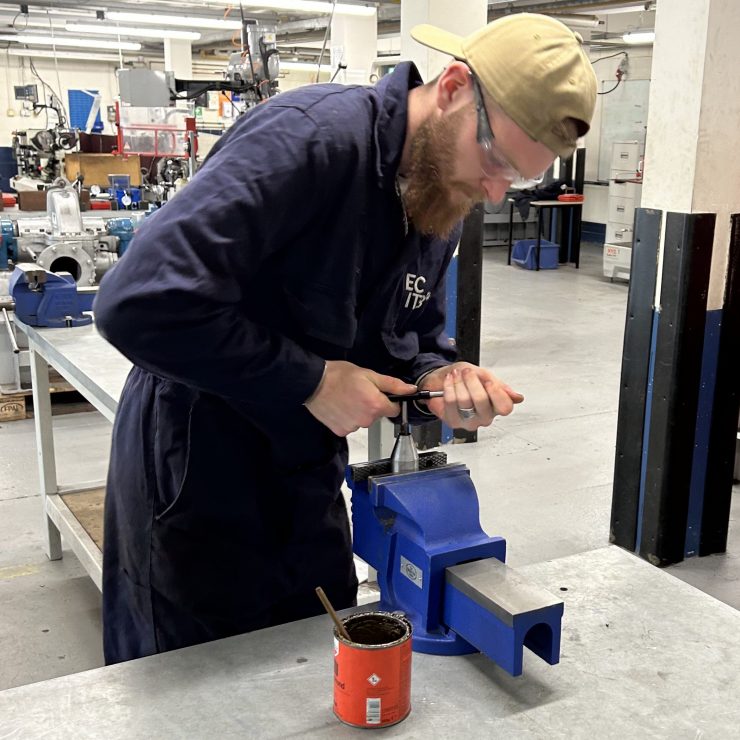The Engineering Construction Industry Training Board’s (ECITB) suite of pre-employment courses is helping new entrants to industry prepare for life on site.
Industry experts describe the ECITB’s short courses for site operations as “essential” for setting workers up for what to expect when they take their first steps in the engineering construction industry (ECI).
With site operations activities underpinning onsite craft and technical work, the ECITB offers six short courses to upskill operatives new to working on a site.
The six are abrasive wheels, firewatcher, confined space (low and medium risk), manual handling, working at height and working safely with hand and power tools.
These courses are a mixture of knowledge theory and practical activities in the workshop, with attendees needing to have completed health and safety training in advance, such as the CCNSG Safety Passport.
Ray Skene, Technical Products Manager at the ECITB, said: “These courses provide the basics all workers need in the industry and set you up for what to expect on an ECI site.
“Every sector needs certain skills and knowledge and 95% of the time that will involve the basic skills contained in our short courses. Having these gives a foundation in the safety requirements related to some of the hazardous activities within the industry.
“The practical nature of these courses means people are gaining an awareness and appreciation of what to expect as they are accessing high platforms and in confined spaces as part of the training.”

Programmes delivering short courses
The short courses are developed for industry, by industry and are based against training standards. The working group that supported the development of the courses is made up of training providers, employers and the ECITB.
The courses, which each last one day, can be delivered standalone or together as a programme, such as the Hinkley Support Operative (HSO) Bronze programme.
HSO Bronze uses the short courses to train people to work as general labourers at Hinkley Point C in Somerset. The nuclear power station is the first to be built in over 20 years and one of the largest construction sites in Europe.
The ECITB also offers the courses as part of its Pre-Employment Programme (PEP), which lasts eight days and includes gaining a CCNSG Safety Passport.
The PEP is used for career pathway initiatives such as the Work Ready Programme, which was developed to create a pipeline of new entrants to industry.
The programme is a collaborative and co-funded industry initiative which is running across the UK in areas like Cumbria, Yorkshire and the Humber, Teesside, Hampshire and Pembrokeshire, pictured.
Attendees, who are 18+ and include the unemployed, gain recognised industry skills and qualifications as part of a 16-week programme that leads to employment opportunities.
The opening week involves cohorts being put through the PEP by training providers like Pembrokeshire-based Providence Training, which has been associated with the ECITB for 30 years.
David Warrell, Director at Providence Training, said: “The Pre-Employment Programme is essential to the industry as it takes people with very little experience and gives them foundation skills and knowledge of what to expect on a site.
“The work-at-height training, for example, shows what it’s like going up a scaffold rig on a refinery or hazardous plant.
“Having been through the PEP training, the employer knows what an individual or potential employee has gone through, so it’s a good foundation for site work.”
Site Operations short courses explained
On completing the ECITB short courses, a site operative will be able to:
- Safely and effectively operate hand-held and mounted abrasive wheel tools.
- Observe and monitor fire risk and hot work areas and know what to do if a fire is discovered.
- Safely work in a confined space, know the hazards, control and safety measures and what precautions should be taken.
- Use safe manual handling and recognise the risks associated with poor techniques.
- Prepare for and access at-height working locations.
- Identify, safely use, store and check a range of tools so they can carry out basic engineering tasks.
The courses are ready-made for training providers to deliver if they have the correct facilities. To find out more, providers can email:
- programmeadmin@ecitb.org.uk





